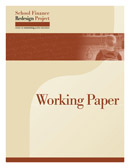This working paper suggests how a performance-driven system would allocate funds, monitor performance, constantly search for more productive models of instruction, and replace less effective schools and programs as more effective ones became available.
Such an educational system would be in constant search for better options. This would lead to serious experimentation with new learning methods, new mixes of technology and teacher work, and new organizational supports for schools. Over time the result would be greater knowledge about instructional methods and a better supply of schools. The options available for disadvantaged students in particular should improve as schools, free of today’s constraints on use of time, money, staff, and salaries, pursue modes of instruction that work for the most disadvantaged and as new schools based on promising methods emerge. They argue that such an approach is the only way communities can learn whether the gross amounts of money now available, rather than ineffective uses of available funds, prevent higher school and student performance.





